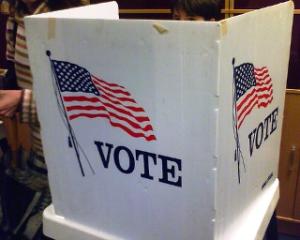Less than two weeks out, a couple of these races are turning into nailbiters.
Inter se agreements acknowledge global treaty provisions while crafting new agreements holding among participating member states.
It's been a whipsaw week for Michigan's unlicensed dispensaries, Oklahoma sees its first legal medical marijuana sales, and more.
A Border Patrol agent gets in trouble, and so do a crooked trio of Miami cops.
The Michigan marijuana initiative still has a healthy lead as Election Day nears, the FDA has granted "breakthrough therapy" status for psilocybin for treatment-resistant depression, and more.
A lawsuit using federal RICO statutes to challenge Colorado's legal pot law got underway today, North Dakota medical marijuana patients and caregivers can now apply to the registry, Brazil's president-elect is a giant step backward on drug policy, and more.
A new poll has support for marijuana legalization in New Jersey at 58%, Kansas gubernatorial candidates debate marijuana policy, truck drivers will face hair drug testing one of these years, and more.
With less than two weeks to go to Election Day, its looking like a mixed picture for state-level marijuana policy initiatives. There are two states -- Michigan and North Dakota -- with marijuana legalization on the ballot and there are two more states -- Michigan and Utah -- with medical marijuana initiatives on the ballot.
It's possible that all four will pass, but it's looking more likely in Michigan and Missouri than in North Dakota and Utah. In North Dakota, well-funded opposition may drown out the legalization message, while in Utah, late maneuvering by the Mormon church and state political leaders is undercutting support from what had previously appeared to be a measure cruising toward victory.
Here's a quick recap of the initiatives and their prospects:
Michigan
Michigan is poised to become marijuana legalization's Midwest breakout state. The Coalition to Regulate Marijuana Like Alcohol has qualified a marijuana legalization initiative, Proposal 1, for the November ballot.
The measure would legalize the possession up to 2.5 ounces of pot for personal use and up to 10 ounces at home, as well as allowing for the personal cultivation of up to 12 plants and the fruits of that harvest. It also creates a system of taxed and regulated marijuana commerce, with a 10 percent excise tax at the retail level in addition to the 6 percent sales tax. The measure would give cities and counties the option of allowing pot businesses or not.
The initiative looks well-positioned to win in November. It had been holding steady at 61 percent support as late as May, the kind of polling numbers initiative and referendum experts like to see at the beginning of the campaign because they suggest that even with the inevitable erosion of support in the face of opposition attacks, the measure still has a big enough cushion to pull off a victory.
Support had indeed declined in the final weeks of the campaign as limited opposition finally emerged, but a September Detroit Free Press poll still has it winning with 55 percent of the vote and only three percent undecided and a September Detroit News poll had it winning with 56 percent.
Missouri
Missouri voters will be able to choose from not one, not two, but three separate medical marijuana measures when they go to the polls in November. Two are constitutional amendments; one is a statutory initiative that could more easily be modified by the legislature.
Amendment 2, sponsored by New Approach Missouri, would allow doctors to recommend medical cannabis for any condition they see fit. Registered patients and caregivers would be allowed to grow up to six marijuana plants and purchase up to four ounces from dispensaries per month. Medical cannabis sales at dispensaries would be taxed at 4 percent.
Amendment 3, sponsored by Find the Cures, would let doctors recommend medical marijuana to patients who have any of a specific list of qualifying conditions (while regulators would be able to add more conditions in the future). The retail sales tax on medical marijuana would be set at the much higher rate of 15 percent. Funds would be used to support research with the aim of developing cures and treatments for cancer and other diseases.
Proposition C, backed by Missourians for Patient Care, also outlines a list of specific conditions that would qualify patients to legally use medical cannabis. Sales would be taxed at 2 percent.
An August poll conducted by TJP strategies had support for amending the state constitution to allow medical marijuana at 54 percent.
That there are three separate measures on the ballot could lead to some confusion. If multiple ballot measures on the same topic pass, the one with the most votes generally prevails. But because in this case two of the measures are constitutional amendments and one is a statutory measure, if the statutory measure gets more votes than either of the amendments, but at least one of them passes, it could be up to the state's court system to figure out which goes into effect.
While there is nothing stopping voters from voting "yes" on all three measures, there are also concerns that the multiplicity of options could result in splitting the pro-medical marijuana vote, with some voting "yes" on only one measure and "no" on the others. In this election, when it comes to medical marijuana, Missouri may have too much of a good thing.
There has been no more recent polling, but with 93% of the nation backing medical cannabis in an April 2018 Quinnipiac University poll, it's likely that Missouri isn't going to buck the trend. The fundraising also points toward a successful campaign. Both New Approach Missouri and Find the Cure have raised more than a million dollars over the course of the campaign and both still have tens of thousands of dollars banked for the final push. The only ballot committee opposed to both campaigns, Citizens for Safe Medicine, was just registered last month and has reported no donations or expenditures.
North Dakota
This year, a grassroots group, Legalize ND, managed to get enough signatures to get Measure 3, the Marijuana Legalization and Automatic Expungement initiative, on the November ballot.
This is a radical initiative. It would legalize all forms of marijuana for adults by removing marijuana, THC, and hashish from the state's controlled substance schedules, and it sets no limits on the amount of marijuana people could possess or how many plants they grow. It also provides for the automatic expungement of criminal convictions for anyone convicted of a marijuana-related crime that would be legal under the measure.
And it does not create a framework for regulated marijuana sales, nor does it set any taxes. Creating a system of taxed and regulated marijuana commerce would be up to the state legislature.
Legalize ND faces the toughest odds. While a June poll, commissioned by Legalize ND and conducted by the Florida-based Kitchen Group, had the initiative winning 46 percent to 39 percent, with 15 percent undecided and a poll this month, also commissioned by Legalize ND had it winning with 51 percent to 36 percent, two other recent polls have support at under 40 percent.
It also faces the toughest organized opposition, which is heavily out-fundraising it. While Legalize ND has raised less than $30,000 in cash and in-kind contributions, the national anti-marijuana lobbying group Smart Approaches to Marijuana (SAM) has provided 100 percent of the contributions to Healthy and Productive North Dakota, an amount totaling more than $156,000.
A separate anti-initiative committee, North Dakotans Against the Legalization of Recreational Marijuana, which represents business groups and is headed by the director of government affairs for the state Chamber of Commerce, has raised $86,000. If Legalize ND can pull off a victory, it will be sweet, indeed, but it's looking like an uphill battle.
Utah
Sponsored by the Utah Patients Coalition, the medical marijuana statutory initiative, Proposition 2, has qualified for the November ballot. The bottom-up effort comes after the state legislature has refused to advance meaningful medical marijuana legislation.
Under the measure, people who suffer from one of a list of designated qualifying medical conditions could receive a medical marijuana card with a physician's recommendation. That would entitle them to possess up to two ounces of marijuana or any amount of a marijuana product with up to 10 grams of THC. Patients could not grow their own unless they live more than 100 miles from a dispensary. And the patients cannot smoke marijuana.
A Utah Policy poll released in September had support for the measure at 64 percent, with even Mormons generally breaking with the church leadership on the issue. But after that poll was released, state political leaders, advocates, and the Mormon church announced they'd agreed on a medical marijuana plan that lawmakers would consider in a November special session. That has, to some degree, cut the legs out from under the initiative.
A Salt Lake Tribune poll released last week had support dropping to only 51 percent, with 46 percent opposed. What looked like a cakewalk just a few weeks ago has turned into a nailbiter.
There you have it. Marijuana could go four for four this year, but it's not at all at da one deal, and we may end up having to settle for only three or maybe even two out of four. Going only 50-50 on marijuana initiatives would be the worst performance of the modern era. Let's hope 2018 doesn't earn that distinction.
back to top
Uruguay legalized marijuana in 2013. Canada legalized it last week. In doing so, both countries put themselves in clearly violation of the UN anti-drug treaties that are the legal backbone of global drug prohibition. The US arguably continues to do so through state-level legalization accommodated by federal practice.
Not much has happened. That's because the treaties are toothless; they have no effective enforcement mechanisms that apply to most countries. If a country that grows opium for the global medicinal market, the International Narcotics Control Board can threaten to revoke its rights under the global quota system, for example. But while the global anti-drug bureaucrats at the INCB can write irate memos criticizing Ottawa and Montevideo, that's about it. They have done so, and Canada and Uruguay have blithely ignored them.
Still, the 1961 UN Single Convention on Narcotic Drugs and its 1971 and 1988 follow-ups are global agreements, and while an argument can be made that countries that want to legalize marijuana or other drugs should just ignore that provision -- say, on the basis that they are prioritizing the human rights treaties -- there is a counterargument to be made that it is better to modify or creatively interpret the existing global framework than to merely brush aside the anti-drug treaties.
The good folks at the Transnational Institute's (TNI) Drugs and Democracy program have come up with what they call "an elegant way" to end global prohibition agreements. It's called inter se modification. Instead of ignoring the tension between national-level legalization and the treaties, using this strategy would "resolve those treaty tensions and enable progressive and sustainable change at the global level."
What inter se modification does is allow two or more signatory states to the UN conventions to enter into an agreement among themselves alone. As TNI explains in the video below, a group of countries -- say Canada, the Netherlands, and Uruguay -- could agree to an inter se modification agreement on how marijuana cultivation should take place, how international commerce should be conducted, and education and public health policies, among others.
"These three countries would basically create a mini-treaty of their own, while at the same time respecting the rights and obligations of all state parties that do adhere to the UN drug control conventions," TNI explains. "If other countries wish to legally regulate cannabis after this mini-treaty is agreed on, they are free to join the group and enjoy the benefits accordingly."
Here we have a way to legalize marijuana or other drugs at the national level which at least acknowledges what the UN treaties say about that, and which seeks to minimize the tension that legalization generates in the treaty system. The treaties' provisions calling for prohibition would simply be hollowed out over time as country after country eventually joins the inter se modification agreement. Maybe then there will come a tipping point where the treaties themselves can be amended to reflect the new global reality.
Here's how TNI explains it all:
back to top
It's been a whipsaw week for Michigan's unlicensed dispensaries, Oklahoma sees its first legal medical marijuana sales, and more.
Michigan
Michigan Regulators Say More Than 200 Unlicensed Michigan Dispensaries Must Close Down By Wednesday. The state's Medical Marijuana Licensing Board has approved 14 more dispensary licenses, but some 215 pot businesses that have not obtained licenses, most of them in Detroit, received cease and desist letters Tuesday and must close their doors by Wednesday if they want any chance at getting a license in the future.
Michigan Judge Blocks Halloween Shutdown of Unlicensed Dispensaries. The same day state regulators ordered more than 200 unlicensed dispensaries to shut down by Wednesday, a Michigan judge blocked that order. Court of Claims Judge Stephen Borello granted a motion Tuesday that kills the state's latest attempt to shut down any medical marijuana dispensaries operating without a license. Borello issued a temporary injunction blocking the shutdowns and barring the state from imposing any other licensing deadlines until the court rules again.
North Dakota
North Dakota Patients and Caregivers Can Now Register. The state Department of Health began accepting applications Monday for medical marijuana patients and caregivers, with registry cards to begin being mailed out in December. It costs $50 to apply. The move comes just under two years after voters there approved a medical marijuana initiative.
Oklahoma
Oklahoma Medical Marijuana Dispensaries Celebrate First Day of Legal Sales. The Sooner State saw its first legal medical marijuana dispensary sales last Friday. Some 600 dispensary licenses have already been approved, but only a handful of stores were actually open on opening day. That will change in the coming months.
[For extensive information about the medical marijuana debate, presented in a neutral format, visit MedicalMarijuana.ProCon.org.]
back to top
A Border Patrol agent gets in trouble, and so do a crooked trio of Miami cops. Let's get to it:
In Miami, three Miami police officers were arrested last Tuesday on an array of federal drug and corruption charges from distributing dozens of kilos of cocaine to protecting drug dealers. Veteran officers Schonton Harris and Kevin Harris and new recruit James Archibald. Among other charges, the trio are accused of collecting a total of $33,500 in cash from sales of opioids like Percocet, selling and transporting dozens of kilos of cocaine, selling a police uniform and a badge to an undercover detective who claimed to be a cartel assassin wanting to use it in a hit. After being alerted to questionable activities in April, the FBI set up a sting operation that has now apparently thoroughly ensnared the trio.
In Tucson, Arizona, a Border Patrol agent was indicted Monday for allegedly conspiring to smuggle cocaine into the country. Agent Ramon Antonio Monreal Rodriguez, 32, is accused of exchanging $334,000 in cash for 41 kilograms of cocaine near the San Miguel border crossing and a few days later transferring $317,000 in cash to a smuggler at the border. Authorities said Rodriguez received $66,000 and six pounds of cocaine for his efforts. They have seized the cash and the drugs. He is charged in federal court with conspiracy to distribute more than five kilos of cocaine.
back to top
The Michigan marijuana initiative still has a healthy lead as Election Day nears, the FDA has granted "breakthrough therapy" status for psilocybin for treatment-resistant depression, and more.

The FDA thinks there could be something magic in these mushrooms. (Creative Commons)
Michigan Poll Has Legalization Initiative With Comfortable Lead. A new Detroit Free Press poll has the Proposal 1 legalization initiative favored by a margin of 57% to 41%. That's nearly unchanged from the previous Detroit Free Press poll in September, which had the issue winning 56% to 41%. "Even though there are some law-enforcement groups and others that are putting out information against the proposal, it seems to have pretty solid support," the pollsters noted. "There has always been a perception that there are far too many people in jail for a minimal amount of use and that it prohibits the police from spending time on more serious crimes."
Michigan Marijuana Foes Spending Big Bucks. The organized opposition to Proposal 1, known as Healthy and Productive Michigan, has collected more than $1 million in the past quarter, nearly double the $529,000 raised by the Coalition to Regulate Marijuana Like Alcohol Coalition, which is leading the "yes" campaign. The opposition still has $600,000 in the bank, which it is using for a series of cable TV ads. But the polling suggests the ads aren't working. Smart Approaches to Marijuana (SAM) ponied up more than $600,000 to defeat the measure, while executives from DTE Energy have donated more than $300,000.
Oregon County's Lawsuit Challenging State Legalization Thrown Out. A federal judge has dismissed a lawsuit from Josephine County contending that federal law criminalizing marijuana preempts the state's law allowing commercial production and sales. US District Court Judge Michael McShane ruled last Thursday that cities and counties don't have standing to sue a state in federal court. The county has not yet decided whether it will appeal the ruling.
Medical Marijuana
Oklahoma Medical Marijuana Dispensaries Celebrate First Day of Legal Sales. The Sooner State saw its first legal medical marijuana dispensary sales last Friday. Some 600 dispensary licenses have already been approved, but only a handful of stores were actually open on opening day. That will change in the coming months.
Psychedelics
FDA Grants "Breakthrough Therapy" Status for Psilocybin to Treat Depression. The Food & Drug Administration (FDA) has granted Breakthrough Therapy status to psilocybin -- the psychedelic ingredient in magic mushrooms -- for use in treating depression after early experimental results showed promise. The designation allows the FDA to expedite research and review of psilocybin-based treatments. It is aimed specifically at a Phase IIb trial currently underway investigating the optimal dose range for psilocybin used for severe treatment-resistant depression.
back to top
A lawsuit using federal RICO statutes to challenge Colorado marijuana legalization got underway today, North Dakota medical marijuana patients and caregivers can now apply to the registry, Brazil's president-elect is a giant step backward on drug policy, and more.

Brazilian President-Elect Jair Bolsonaro favors harshly repressive drug policies. (Creative Commons)
Colorado Lawsuit Challenging State's Marijuana Law Goes to Trial. A lawsuit filed by two landowners who claim that a nearby marijuana grow has reduced their property values -- in part because the smell allegedly makes horse riding less attractive -- got underway in federal court in Denver Tuesday. The case is based on federal racketeering laws, and an adverse decision could have significant disruptive effects on the state's marijuana industry. The lawsuit was filed by Safe Streets Alliance, a national anti-marijuana group.
New Jersey Lawmakers Aim for Marijuana Hearings Next Month. State Senate President Stephen Sweeney (D-3rd District) told reporters Monday he had been meeting with Sen. Nicholas Scutari (D-22nd District) on advancing marijuana legalization legislation, and "I think we're real close." While Sweeney did not offer any firm timelines, Scutari said he has been looking at holding a hearing on November 26.
Medical Marijuana
More Than 200 Unlicensed Michigan Dispensaries Must Close Down By Wednesday. The state's Medical Marijuana Licensing Board has approved 14 more dispensary licenses, but some 215 pot businesses that have not obtained licenses, most of them in Detroit, received cease and desist letters Tuesday and must close their doors by Wednesday if they want any chance at getting a license in the future.
North Dakota Patients and Caregivers Can Now Register. The state Department of Health began accepting applications Monday for medical marijuana patients and caregivers, with registry cards to begin being mailed out in December. It costs $50 to apply. The move comes just under two years after voters there approved a medical marijuana initiative.
Heroin and Prescription Opioids
Massachusetts Governor Seeks $5 Million for Opioid Drug War. Gov. Charlie Baker (R) will file legislation seeking $5 million for a pilot program for a "regional, multi-agency approach to fentanyl interdiction and crime displacement," he said Monday. He said his proposal targets drug dealers who move from town to town to evade police crackdowns. "We want to give departments the resources to coordinate with each other across their districts, essentially flooding the zone against the drug dealers who are peddling addiction and death in their communities," Baker said. "We want to go after the dealers who too often evade authorities by moving to another nearby location in a different municipality." The $5 million would be used to "supplement surveillance work and overtime costs for units," he said.
International
Brazil's Presidential Election Winner is Bad News on Drug Policy. Jair Bolsonaro, the winner of Sunday's Brazilian presidential election and known as "the Trump of Brazil" for his right-wing populist views, is bad news for drug reform in Latin America's most populous country. He favors intensifying ongoing bloody crackdowns on people involved with drugs, he has said on repeated occasions that police should kill people suspected of drug trafficking, and he has openly praised Philippines President Rodrigo Duterte's bloody drug war, saying "he did the right thing for his country." He opposes marijuana legalization, saying it would "benefit traffickers, rapists, and hostage takers." And Bolosonaro isn't just bad on drug policy; he gets downright weird. He has also claimed, in a bizarre homophobic rant, that smoking pot makes people gay.
back to top
A new poll has support for marijuana legalization in New Jersey at 58%, Kansas gubernatorial candidates debate marijuana policy, truck drivers will face hair drug testing one of these years, and more.

Hair drug tests for truck drivers could be coming soon under an opioids bill signed into law this month. (Creative Commons)
Kansas Gubernatorial Debate Highlights Sharp Differences on Marijuana Policy. In a pre-election debate Tuesday, gubernatorial candidates Kris Kobach (R) and Laura Kelly (D) differed on marijuana policy. Kobach said he opposed both medicinal and recreational marijuana while expressing some openness to using CBD. "With medical marijuana, I don't think the time is right," he said. Kelly said she supports marijuana legalization, and especially the legalization of medical marijuana. "There are many benefits for young children with severe seizure disorders and for end-of-life use," said Kelly. "It would also be incredibly helpful in helping to reduce the opioid crisis." She also called for sentencing reform for marijuana offenses. "We are destroying our families and costing the state of fortune," said Kelly. "We need treatment options, not incarceration." Independent candidate Greg Orman also said he supported legalization. The latest polls have the race between Kelly and Kobach too close to call.
New Jersey Poll Has Strong Support for Legalization. A new Rutgers Eagleton poll has support for marijuana legalization at 58% with only 37% opposed. Nearly four out of five of those supporting legalization said they viewed it as a social justice issue. The poll comes as the legislature tries to get its act together to advance marijuana legalization legislation next month.
Medical Marijuana
Michigan Judge Blocks Halloween Shutdown of Unlicensed Dispensaries. The same day state regulators ordered more than 200 unlicensed dispensaries to shut down by Wednesday, a Michigan judge blocked that order. Court of Claims Judge Stephen Borello granted a motion Tuesday that kills the state's latest attempt to shut down any medical marijuana dispensaries operating without a license. Borello issued a temporary injunction blocking the shutdowns and barring the state from imposing any other licensing deadlines until the court rules again.
Asset Forfeiture
Supreme Court to Hear Indiana Asset Forfeiture Case Next Month. The US Supreme Court will hear oral arguments on November 28 on whether Indiana officials in effect imposed "excessive fines" on a man who pleaded guilty to selling heroin by seizing his vehicle, which was valued at more than the maximum fine for his offense. Cops seized a $42,000 Land Rover belonging to Tyson Timbs, which he bought with an inheritance after his father's death. The maximum fine for dealing heroin in Indiana is $10,000..
Drug Testing
Congressional Opioid Bill Demands Hair Drug Testing for Truck Drivers. The omnibus opioid bill passed by Congress and signed into law by President Trump earlier this month calls for making progress on standards for hair drug testing of truck drivers. Drug testing of hair samples provides a much longer window to detect drug use than urine or blood tests. Hair testing was okayed in the 2015 FAST Act, but the Department of Homeland Security has so far failed to provide hair drug testing protocols. The new law requires DHS to provide guidelines and for the Substance Abuse and Mental Health Services Administration to report to Congress on progress in creating and issuing guidelines for hair drug testing.
(This article was prepared by StoptheDrugWar.org's 501(c)(4) lobbying nonprofit, the Drug Reform Coordination Network, which also pays the cost of maintaining this website. DRCNet Foundation takes no positions on candidates for public office, in compliance with section 501(c)(3) of the Internal Revenue Code, and does not pay for reporting that could be interpreted or misinterpreted as doing so.)
back to top






